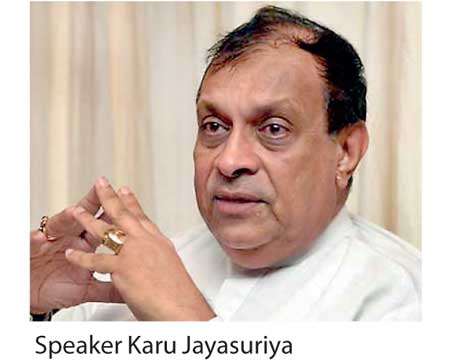Tuesday Feb 17, 2026
Tuesday Feb 17, 2026
Wednesday, 20 September 2017 00:10 - - {{hitsCtrl.values.hits}}

By Ashwin Hemmathagama, Our Lobby Correspondent
Only obtaining two-thirds majority support in the House and public approval at a referendum, followed by the endorsement of the President, can authorise the 20th Amendment Bill to the Constitution, the Supreme Court informed Parliament.
Announcing the determination yesterday, Speaker Karu Jayasuriya said: “I wish to announce to the House that I have received the determination of the Supreme Court in respect to the Bill titled ‘20th Amendment to the Constitution’, which has been challenged in the Supreme Court in the terms of Article 121(1) of the Constitution. The majority of the Court has determined that clauses 2, 3, and 4 of the Bill are inconsistent with articles 3, 4, 12 (1) and 14 (1) of the Constitution.”
According to Article 3 of the Constitution, the sovereignty is in the people and is inalienable. The sovereignty includes the powers of government, fundamental rights and the franchise. Article 4 describes the manner in which the sovereignty of the people is exercised and enjoyed. The right to equality is upheld by Article 12 (1) where all persons are found equal before the law and are entitled to the equal protection of the law. The freedom of speech, freedom of peaceful assembly, the freedom of association, the freedom to engage by himself or in association with others in any lawful occupation, profession, trade, business or enterprise, and the freedom of movement are some of the many entitlements provided by Article 14 (1) of the Constitution.
“Under Article 83, the Bill shall become law if the number of votes cast in favour thereof amounts to not less than two-thirds of the whole number of Members (including those not present) approved by the People at a Referendum and a certificate is endorsed thereon by the President in accordance with Article 80,” added the Speaker, ordering to print the determinations in the official report of yesterday’s proceedings,” he held.
The 20th Amendment Bill to the Constitution was moved in Parliament on 28 August. The Bill sought House approval to insert two new articles and to amend Article 154E. The proposed insertion, which will be placed just after Article 154D, will be cited as Article 154DD where the election of the members to all provincial councils will be held on the same date. The Parliament will have the discretion to determine the date on which all the provincial councils will stand dissolved. However, such a specified date will not be later than the expiration of the terms of the last constituted provincial council.
Article 154E of the Constitution will be amended by the substitution of the words “as a dissolution of the Council” with “as a dissolution of the Council provided, however, upon the determination of the specific date under Article 154DD – (a) the terms of the office of any Provincial Council ending prior to the specific date shall be deemed to be extended up to the specific date and such Provincial Council shall stand dissolved on the specific date; or (b) the term of office of any Provincial Council which continues beyond the specified date shall end on the specified date and such Provincial Council shall stand dissolved on the specified date.” Article 154EE, which will be inserted immediately after Article 154E of the Constitution, will set the ground, providing the Parliament with access to exercise powers of a provincial council. According to the proposed Article 154EE, “In the event of dissolution of any Provincial Council by reason of the operation of the provisions of sub-paragraph © of paragraph (8) of Article 154B or by any other reason specified in any law, the powers of such Provincial Council shall be exercised by the Parliament until the specified date and the provisions of Article 154L and 154M shall, mutatis mutandis apply in relation to the exercise of powers of the Provincial Council.”